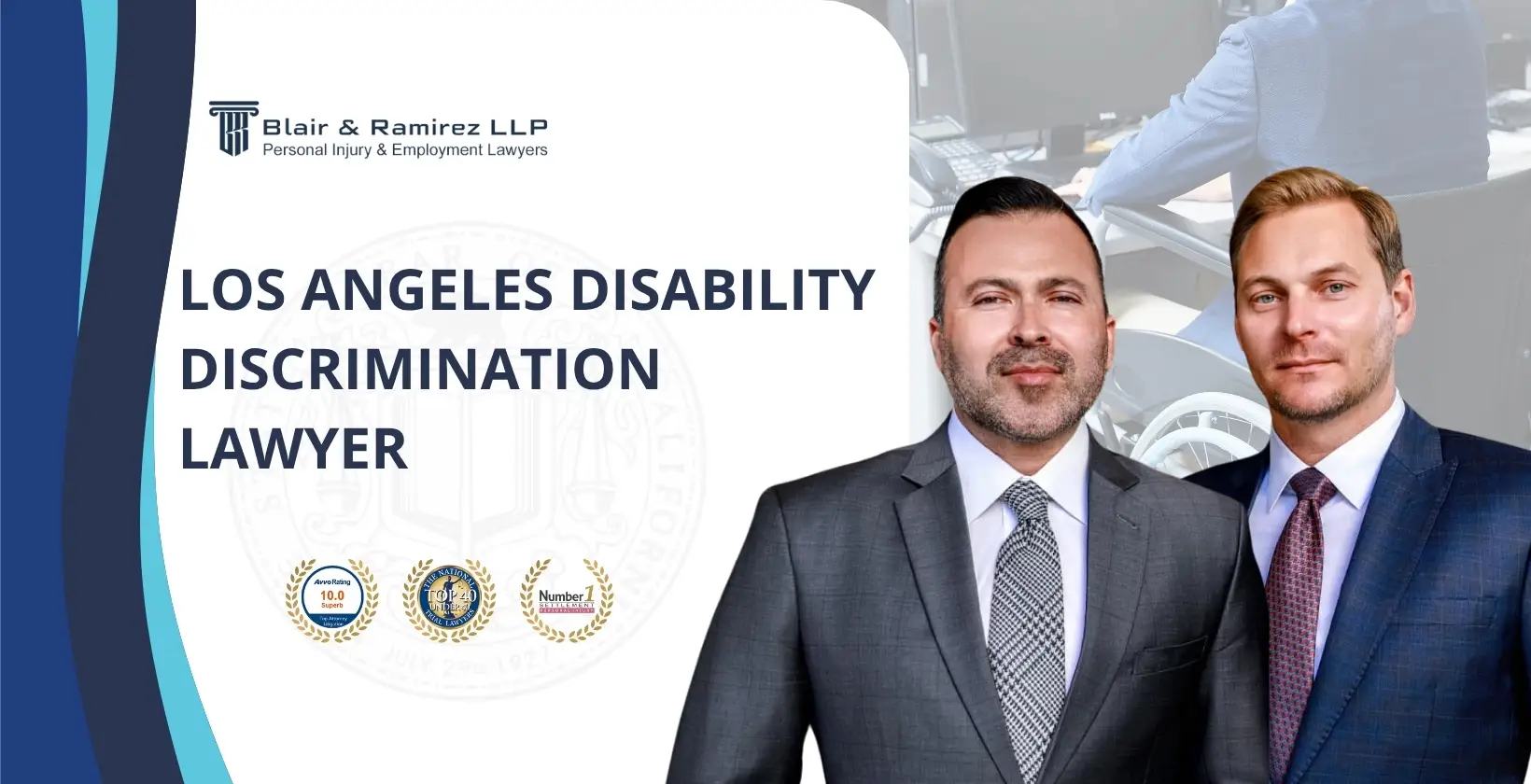Los Angeles Disability Discrimination Lawyer
A Los Angeles disability discrimination lawyer helps you protect your rights when your workplace becomes unfair or unsafe.
If you have been denied accommodations, treated differently after disclosing a condition, or forced to choose between your health and your job, you are protected under the Americans with Disabilities Act (ADA) and California’s Fair Employment and Housing Act (FEHA). You have legal options and support from professionals who understand what you're going through.
At Blair & Ramirez LLP, we represent employees throughout Los Angeles County who are ready to take a stand against disability discrimination. If you are ready to move forward, we are here to guide you and fight for the justice you deserve.
Recent Cases We've Won
$6.25 MILLION Settlement:
$2.54 MILLION Settlement:
$1 MILLION Settlement:
What Sets Blair & Ramirez Apart?
What Does a Los Angeles Disability Discrimination Lawyer Do?
A Los Angeles disability discrimination lawyer steps in to evaluate your situation, guide your legal options, and take action when your rights have been violated. From filing official complaints to standing up for you in negotiations or court, their role is to protect your rights every step of the way.
Investigates Your Situation and Advises on Legal Options
A disability discrimination lawyer reviews your medical history, employment records, and HR interactions to determine whether your rights were violated under the Americans with Disabilities Act (ADA) or California’s Fair Employment and Housing Act (FEHA).
For example, if you requested light-duty work after surgery and were later removed from your position, this may point to discrimination that requires legal attention.
This early review helps clarify if your case qualifies under current disability discrimination laws and whether legal action is the right step.
Files Complaints With the CRD or EEOC
Your lawyer prepares and files the appropriate complaint with either the California Civil Rights Department (CRD) or the Equal Employment Opportunity Commission (EEOC), depending on your case. This includes writing a clear statement of facts, organizing supporting evidence, and meeting all filing deadlines. Each step is handled to help preserve your claim and move your case forward.
Represents You in Hearings, Negotiations, or Court
Legal representation covers every stage from early resolution discussions to formal proceedings. A disability discrimination lawyer advocates for you in mediation, arbitration, administrative hearings, or trial, depending on the facts of your case.
The direction your case takes often depends on the strength of your evidence and whether your employer is willing to resolve the issue outside of court.
Protects You From Retaliation and Employer Pushback
Employees who disclose a disability or request accommodations are protected from retaliation under the law. This can include cut hours, job reassignment, unfair discipline, or reduced responsibilities.
If your employer responded negatively to a protected request such as time off, medical leave, or equipment changes, a qualified disability lawyer can act quickly to defend your rights and pursue recovery.

When to Hire a Los Angeles Disability Discrimination Lawyer
You should contact a Los Angeles disability discrimination lawyer as soon as you suspect a violation of state or federal disability protections. Taking action early allows your lawyer to gather facts, identify legal violations, and respond before your employer controls the narrative.
You Were Fired, Demoted, or Harassed After Disclosing a Disability
If you were fired, reassigned, or mistreated after telling your employer about a disability, you may have experienced illegal retaliation. These actions often violate state and federal protections, especially when they follow a disclosure or accommodation request.
Your Employer Denied a Request for Accommodation
If your employer denied a reasonable accommodation, such as flexible hours, light-duty tasks, or remote work, that may indicate noncompliance with California and federal accommodation requirements. Both FEHA and the ADA require employers to discuss accommodation requests through an interactive process. Delays, denials, or refusals without discussion may indicate noncompliance.
HR Ignored Complaints or Blamed You
If HR dismissed your concerns or blamed you after you raised a disability-related issue, that may reflect a failure to uphold legal obligations. Whether you reported harassment, requested medical leave, or needed support, ignoring your complaint can point to a serious compliance issue.
You are Unsure Whether What Happened Counts as Discrimination
If anything changed at work after disclosure, a legal review can clarify your rights. Many workers miss their chance to take action because they did not realize their experience met the legal definition of discrimination. If anything changed at work after you disclosed a condition and those changes seem unfair or retaliatory, a lawyer can help clarify if your experience breaches disability-related legal standards.
How a Disability Discrimination Lawyer Builds Your Case
Collects Medical Records, Performance Reviews, and Internal Communications
We begin by gathering your medical records, performance evaluations, and internal communications to uncover patterns and timelines. If, for instance, you provided a doctor’s note and were later given poor reviews or denied reasonable accommodations, we use this documentation to establish a direct connection between your disability and your employer’s adverse actions. This evidence is key to building a strong, fact-based case.
Identifies Legal Violations Under FEHA and ADA
Interviews, Witnesses, and Reviews Employer Policies
We interview coworkers, supervisors, and HR personnel to gather witness statements that support your experience. Simultaneously, we examine your employer’s written policies to identify any inconsistencies between stated procedures and how your situation was actually handled. When internal policies promise fair treatment but management acts otherwise, it can reveal a clear pattern of discrimination.
Prepares Legal Arguments for Mediation or Trial
We build a compelling legal case by aligning the facts with the legal standards for disability discrimination. This involves demonstrating:
- You had a qualifying disability
- You were able to perform the essential functions of your job
- You experienced an adverse employment action (e.g., demotion, termination, denial of accommodations)
- Your disability was a motivating factor in that decision
To support these points, we organize a clear timeline, gather key emails, witness statements, and employer policies. For example, if you were terminated shortly after requesting medical leave, we emphasize that timing to show a direct link between your condition and your employer’s actions.
What Legal Outcomes (Beyond Compensation) Can a Lawyer Help You Achieve?
Legal action can lead to more than financial recovery. It can restore your job, secure the accommodations you were previously denied, and help fix broken systems that harmed you.
At Blair & Ramirez LLP, we pursue outcomes that not only correct what happened to you but also help prevent it from happening again.
Job Reinstatement or Enforced Accommodations
If you lost your job after disclosing a disability, you may have the right to get that job back. In other cases, legal pressure can force your employer to provide the accommodations they previously ignored, including job duty changes, schedule adjustments, or access to tools you need to work safely.
These results can help you return to work on your terms, with your rights recognized.
Changes in Company Policy or Employer Accountability
Some cases go beyond one employee. Your claim may lead to updated company policies, new HR protocols, or mandatory anti-discrimination training for managers. In settlements or trial outcomes, these requirements are often part of what we negotiate.
Clients often tell us they want to protect others from going through the same thing, and this is one way we help make that happen.
Settlement Agreements or Court Judgments
Some clients prefer a private settlement that offers closure and compensation quickly. Others want their case heard in court, especially when the employer refuses to accept responsibility.
Each path has different benefits and considerations. At Blair & Ramirez LLP, we explain the process clearly, weigh your goals, and help you decide how to move forward based on the strength of your case.
What Compensation Can You Recover From a Disability Discrimination Claim?
If you win your disability discrimination case, the law allows you to recover more than just back pay. Compensation may include lost wages, emotional distress, and legal costs, depending on the extent of the impact. You can typically recover three types of compensation: economic, non-economic, and recoverable legal expenses.
Economic Damages: Lost Wages and Future Earnings
Economic damages cover the income you lost because of your employer’s actions. This includes back pay after a termination, lost raises, missed promotions, and the future earnings you likely would have earned.
For example, six months of unemployment at $5,000 per month could result in a $30,000 award for back pay. These damages can also cover lost benefits or retirement contributions tied to your job.
Non-Economic Damages: Emotional Distress and Reputation Harm
Disability discrimination often causes emotional stress that affects your confidence, mental health, and relationships. Harassment, public embarrassment, or being fired after disclosing a condition can have lasting effects.
California courts recognize this type of harm as real, and in many cases, these damages make up a large part of the total recovery.
Legal Costs and Attorney’s Fees
Under California’s Fair Employment and Housing Act (FEHA), you can recover legal fees if you win your case. This includes attorney’s fees, expert witness costs, and other court-related expenses.
Our employment lawyers handle these cases on a contingency basis, meaning you pay nothing upfront, and we only collect if we win or settle your case.
What Is Considered Disability Discrimination in the Workplace?
Disability discrimination occurs when an employer treats a qualified employee unfairly because of a physical or mental condition. This may involve denied accommodations, job changes, or termination linked to your condition or request for support.
Definitions Under ADA and FEHA
Understanding what qualifies as disability discrimination starts with how the law defines a disability. Under the Americans with Disabilities Act (ADA) and California’s Fair Employment and Housing Act (FEHA), a disability includes any physical or mental condition that limits a major life activity, such as walking, speaking, focusing, or working. These protections apply even if your condition is temporary, intermittent, or not outwardly visible. As long as you can perform your job with or without reasonable accommodations, the law protects you from unfair treatment.

When Unequal Treatment Becomes Illegal
Workplace mistreatment becomes illegal when a disability is a substantial motivating reason for changes to your employment. These changes, referred to as adverse employment actions, can include demotion, reassignment, denial of promotion, reduction in hours, or termination.
Even minor changes like fewer hours or undesirable shifts may be illegal if linked to your condition. Courts often look at timing, internal communications, and how non-disabled employees in similar roles were treated to determine if discrimination occurred.
What Legal Rights Do Disabled Employees Have at Work?
Disabled employees in California are legally entitled to fair treatment, reasonable accommodations, and protected leave under both state and federal laws. Understanding these rights empowers you to spot discrimination early, assert your needs confidently, and take action before the situation worsens.
Are You Legally Entitled to Reasonable Accommodation?
Yes. If you have a condition that limits a major life activity, you have the right to ask for changes that help you do your job.
Under California law, employers with five or more employees must consider reasonable accommodations, such as modified duties, adjusted hours, or assistive equipment, unless providing them would cause an undue hardship.
Can You Take Medical Leave Under CFRA or FMLA?
Yes. If you are eligible, you can take up to 12 weeks of unpaid, job-protected leave under either the California Family Rights Act (CFRA) or the federal Family and Medical Leave Act (FMLA).
Both allow time off for disability-related treatment, recovery, or a doctor’s recommendation, without risking your job. The FMLA applies only to employers with 50 or more employees, whereas the CFRA covers a broader range of workplaces in California.
What If Your Employer Denies a Disability Accommodation?
If your employer ignores, delays, or outright denies a reasonable accommodation request, it may violate your rights under state or federal law. Employers are legally obligated to engage in a good-faith interactive process - a collaborative discussion to explore possible accommodations. Failing to participate in this process or rejecting your request without justification could open the door to legal action, including filing a complaint, seeking reinstatement, or pursuing compensation.
Is It Illegal for Employers to Retaliate or Harass You?
Yes. It is illegal for an employer to retaliate or harass you for requesting accommodations, disclosing a disability, or filing a complaint.
Retaliation can include reduced hours, sudden discipline, exclusion from meetings, or even leaking your medical information. California law treats these as separate legal violations, and if proven, they can increase the compensation you are entitled to receive.
Which Laws Protect Against Disability Discrimination in California?
California workers are protected by two main laws: the Fair Employment and Housing Act (FEHA) and the Americans with Disabilities Act (ADA). These laws define disability, set employer responsibilities, and govern how accommodations must be handled.
California FEHA: State Worker Protections
FEHA applies to California employers with five or more employees and offers broader protections than federal law. It covers physical, mental, temporary, and perceived disabilities.
FEHA requires employers to prevent discrimination and engage in a good-faith interactive process when an employee requests accommodations.
Federal ADA: National Legal Standards
The ADA applies to employers with 15 or more workers and protects employees whose conditions limit a major life activity. While it shares similar goals with FEHA, the ADA does not require a formal interactive process and places stricter caps on damages. Employers must still provide reasonable accommodations unless it would cause an undue hardship. Federal disability claims follow different procedures and timelines from California cases.
Which Employers Are Covered and What Constitutes a Violation?
These laws apply to every stage, from interviews to termination. An employer may be in violation if they:
- Deny, ignore, or delay a reasonable accommodation request.
- Fire, demote, or discipline an employee because of a disability.
- Refuse to participate in the interactive process.
- Retaliate after a request for support or a discrimination complaint.
These actions may justify a legal claim when they are tied to your disability or your attempt to assert your workplace rights.
The Role of the Interactive Process
The interactive process is a mandatory step under FEHA and the ADA. It requires both the employer and employee to work together to identify reasonable accommodations. Before denying a request, the employer must ask questions, review medical documentation, and explore workable alternatives in good faith.
Failing to participate in this process or ending it prematurely can be treated as a legal violation under both California and federal law.
Who Needs a Los Angeles Disability Discrimination Lawyer in California?
If a disability has affected how you are treated at work, from being denied support to losing opportunities, legal help may be appropriate. State and federal laws protect against both obvious and subtle discrimination.
Employees at Covered Workplaces
If you are currently employed and being treated unfairly because of your disability, legal help may be appropriate. This includes denied accommodations, job reassignments after disclosure, reduced hours, or sudden negative evaluations. Whether you work part-time, remotely, or during probation, your rights still apply.
Job Applicants Denied Fair Consideration
Disability protections apply before you are hired. If you are rejected after revealing a medical condition, or if an interview is canceled following a disclosure, the employer may have violated the law. Hiring decisions must be based on qualifications, not assumptions about your condition.
Workers With Temporary or Perceived Disabilities
You do not need a permanent or officially diagnosed condition to be protected. If you are recovering from surgery, pregnancy complications, or an injury, or if your employer wrongly assumes you are disabled, those situations may still qualify for legal protection.
Individuals With Mental or Invisible Disabilities
Conditions like anxiety, PTSD, ADHD, or chronic fatigue are legally recognized. If your condition affects your ability to perform essential job tasks even intermittently, you have the right to accommodations. Employers cannot disregard these conditions because they are not visible.
What is the Deadline to File a Disability Discrimination Claim?
EEOC and CRD (DFEH) Filing Timelines
Filing deadlines depend on whether your complaint is handled under state or federal law:
- EEOC (federal claims):
- 180 days from the date of the discriminatory act.
- 300 days if California law applies (most cases qualify).
- CRD (formerly DFEH - California claims):
- 1 year from the discriminatory action.
- Extensions may apply in limited cases, such as internal investigations or other delays beyond your control.
Filing with the CRD is usually the first step for state claims. In most cases, it must happen within 12 months of the alleged discrimination.
What Happens If You Miss the Deadline
If you file late, your case may be dismissed even if the discrimination is clear. Agencies strictly enforce these limits.
Some exceptions exist under “equitable tolling,” but they require proof that the delay was caused by factors outside your control (e.g., internal grievance procedures or misleading conduct by the employer).
Late claims are harder to prove and often result in lower or no recovery.
Why Acting Early Improves Your Case
Early action helps preserve the details your case depends on, such as emails, text messages, medical records, and witness memories. It also shows that you are taking the issue seriously, which can strengthen your credibility in settlement talks or court.
Frequently Asked Questions About Disability Discrimination in California
Schedule a Free Consultation With a Los Angeles Disability Discrimination Lawyer
Do not wait while your rights are ignored. If you have been denied accommodations, reassigned unfairly, or treated differently because of a disability, we are ready to step in and help.

Call (213) 568-4000 or complete our secure contact form now to speak directly with a Los Angeles disability discrimination lawyer. Your consultation is free, private, and could be the first step toward justice.
Call Us 24/7
(213) 568-4000
Request A Free Consultation

